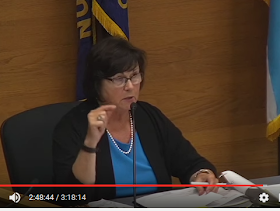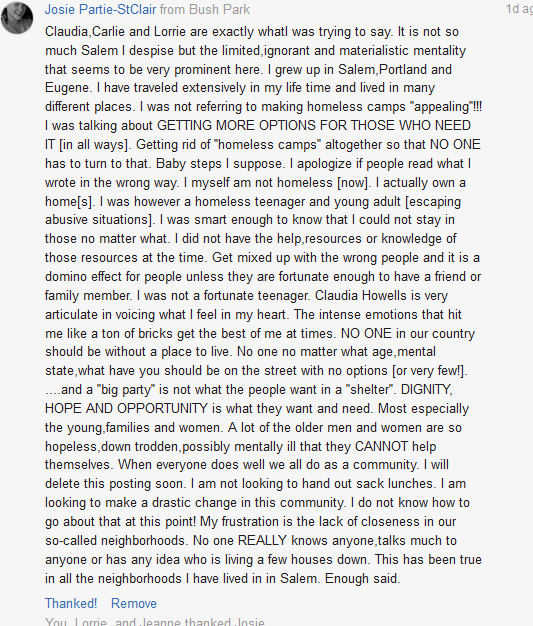Revised: December 2018
By Sarah Owens and Michael Livingston
[Originally posted under the title, "Task Force Chair Rants About City's Failure to Plan for Homeless."]
 |
| Mayor and MWHI Task Force Co-Chair Anna Peterson |
"I see no plan that has come forward to how we’re going to address the tremendous increase in the camping and the loitering and the littering that goes along with it. I don’t see any plan coming forward. I don’t sense any sense of urgency on the part of the City to address a problem that’s creating unsightly issues in our neighborhood, people camping under the High Street Bridge and the parks." - Mayor Anna Peterson
Last week at the Salem City Council meeting, Mayor and Mid-Willamette Homeless Initiative Task Force Co-Chair Anna Peterson chided the City Council and City Staff about the increasing numbers of people camping in and around Salem, including under the bridge next to her High Street condo, and the City's failure to develop a plan to address the problem:
I will speak to the motion [to increase the hours of the new park ranger position from ½ time to ¾ time] …there is a huge concern out in the community about how these parks are going to be supervised with the new bridge which is going to attract more of the public to them, but also which is going to create greater flow of everybody who uses the parks which does include the growing homeless population that we have here in Salem…I am concerned about two things: I am concerned that we do not enforce the rules that we have on our books. We do not enforce the ordinances that we have now, because if we did, we would not have camping in the parks. If we did, we wouldn’t have the illegal behaviors that are allowed to go on at Marion Square Park. We just simply wouldn’t have them. But we don’t enforce, and I’ve been complaining about it ever since I became Mayor, and I’ve really been complaining about it in the last couple of years. I see no change. I see no plan that has come forward to how we’re going to address the tremendous increase in the camping and the loitering and the littering that goes along with it. I don’t see any plan coming forward. I don’t sense any sense of urgency on the part of the City to address a problem that’s creating unsightly issues in our neighborhood, people camping under the High Street Bridge and the parks, et cetera. That’s one very big concern I have…I know I sound like I’m going off on a rant here…
Maybe it's true that, if the City enforced the ordinances that we have now, we would not have camping in the parks. But we would also be having to explain our actions to HUD, putting our
federal homeless assistance grants at risk, and potentially defending our actions in a big,
federal lawsuit. Maybe the Mayor forgot the advice Jerry Moore gave her last August, that "we're not going to arrest our way out of this" and what she's been told about the harm-reduction model of policing used by the
Downtown Enforcement Team. One thing's clear, though, she's not happy about the situation. Nobody is.
The campers under the High Street Bridge a couple of weeks ago were the constituents of Councilor Tom Anderson, who had sought to have them removed when neighbors complained through social media. There ensued a lengthy conversation, pasted below in its entirety, with the exception of one comment that wasn't expanded all the way.
Two things stand out about this conversation: 1) at least
some Salem residents see their neighbors' sleeping under bridges as a piece of a much larger problem, and 2) they're prepared to act, but all they can or know to do are little things. But, even when they combine efforts, they most often aim small, letting people sleep in their church, or on their porches, or handing out toiletries or food, or providing chemical toilets and trash service.
 |
| Some of the Illicit Camps in Salem |
But such actions, while satisfying to the parties to the transactions, don't address the basic problem, which is housing.
A group calling itself Home Base Shelters of Salem (HBSS) is working on a proposal to permit a sanctioned camping program in Salem, along the lines of
the one in Eugene. HUD doesn't count these programs as providing shelter, though, and
for good reason.
Nevertheless, that's how HBSS is billing their proposed camp, as "safe and legal temporary shelter", according to the draft letter to the City Council shared at the August meeting of the Salem Homeless Coalition. HBSS says their program "will begin solving the problem of illegal, undesirable camps" that so concern the Mayor and others in Salem. But, it's not clear how making a camp "safe and legal" transforms it into "shelter."
The program HBSS is proposing includes a long list of rules and restrictions, including no drugs, alcohol, paraphernalia, or firearms, no tolerance of theft or violence, adherence to a schedule, and service expectations. Just the sort of rules and restrictions that shelters like UGM and TSA have, and that people live in tents in the woods to avoid.
Which is not to say that there are not some in the woods who would prefer the structure and support of the HBSS program. Let's just assume, for the sake of discussion, that there are. Then the relevant question -- and the one HBSS should be prepared to make to Council at some point -- is whether HBSS can demonstrate a) that it has the expertise, donors and volunteers it needs to succeed, and b) that they have satisfied the reasonable concerns of neighbors about the program. Unfortunately, that's what's missing from the current HBSS proposal. Here's what they're asking:
HBSS requests that the City Council direct staff to develop a plan to implement the pilot project. The plan would seek to conclude work necessary to permit construction to begin before January 1, 2017, and would include reports to the Council at each meeting on the staff's progress in implementing the project. Staff would work to (1) locate one or more potential sites for camps; (2) work with HBSS to adjust project details to meet City concerns; (3) write an ordinance or resolution adopting the project; (4) apply for permits and licenses necessary to establish the camp; (5) make modifications, waivers, or variances of building, zoning or other codes necessary to facilitate the project; and (6) develop an agreement with HBSS for camp management.
Those interested in projects like this should check out the three-part guide to Homeless Encampments developed by the Center for Problem Oriented Policing (Sharon Chamard, 2010).
Part 1 covers the problem generally.
Part 2 is a guide to help communities analyze their particular issues.
Part 3 helps communities consider suitable and effective strategies.
The HBSS Board consists of Delana Beaton (President and former director of the Salem Outreach Shelter), Pamella Watson (Vice-President and Chair of the Homeless Outreach Committee of the First Congregational UCC), Verena Wessel (Vice-President and Task Force member, formerly with NWHS), Maya Close (Secretary and First Congregational UCC), Kathleen Thorpe (Treasurer and First Congregational UCC), Susie D'Anna (First Congregational UCC), Ken Houghton (MWVCAA ARCHES Program), Jon Reeves (MWVCAA Director and Task Force member), Susan Smith (First Congregational UCC and Willamette University Law School), Linda Strike (MWVCAA ARCHES Program).
First Congregational UCC at 700 Marion Street NE has for the past two years hosted a temporary overnight cold-weather shelter. Last year, they installed a chemical toilet in the church parking lot and operated
"sleeping ministry" which allowed individuals to sleep on the front and back porches of the church building. The sleeping ministry was reluctantly discontinued because of problems with theft and drug use by those not in the program.












